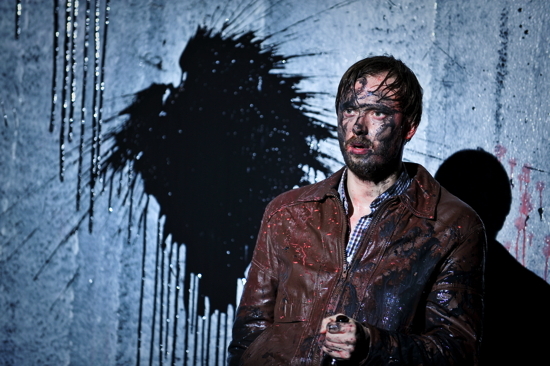One evening in early November, the BAM Harvey Theater in New York City resounded to an electric guitar, a few American pop-rock songs including Bowie's "Changes," the splat of paint-filled balloons hurled against the walls of the set and the words of an incendiary political text published recently in France. For a while, voices from the audience were heard as well, challenging one of the characters on stage or supporting another. There was even a trained dog. It may sound like a crazy anarchist circus or a rally for the Occupy movement -- and in a way it works as the latter. But the occasion was a performance by Berlin's Schaubühne am Lehniner Platz of a 131-year-old play by Henrik Ibsen: An Enemy of the People.
Ibsen's original tells of a doctor in a spa town, Thomas Stockmann, who discovers a pollution problem with the water supply feeding the baths. Determined to announce this as a prelude to getting it cleaned up, Stockmann finds and then loses backing in one quarter after another -- from the mayor to the opposition press -- and he ends as a radical idealist, refusing to compromise with anyone, dismissing virtually the entire town as corrupt enemies of truth. Ibsen had said once that to write is to hold judgment over oneself, but here, incensed by the hostile reception given to Ghosts, he harshly judges everyone except himself.
Having been thoroughly renovated by the Schaubühne's dramaturg, Florian Borchmeyer (who prepared the text), and its artistic director, Thomas Ostermeier (who directed), the play is now performed in modern dress, is garlanded with comic bits, and feels quite contemporary. The doctor, his wife, and two of their newspaper friends launch into a band rehearsal at one point, which the wife soon interrupts for a spat with Stockmann; a couple of laptops appear in another scene. The play's attacks are differently focused as well; politicians, the press, owners of business and industry, and the rest of society are now seen to suffer the ills of modern democratic capitalism.
Borchmeyer hasn't merely updated Ibsen's text; he has rewritten much of it, eliminating minor characters and a lot of secondary discussion, and even rejiggered some of the events of the plot. Anyone who knows the original -- which is something of a dog among Ibsen's major works, though it would be first-rate from an ordinary writer -- will be repeatedly surprised by the Schaubühne's version, and yet in retrospect it's much the same, simply displaying some new and pretty stunning tricks. (The play is no longer in the U.S., but for anyone yet to see it the rest of my text contains spoilers. It will be performed in five more cities on the company's current international tour.) Ibsen's Stockmann convenes a public meeting to reveal his discovery but is pretty quickly voted off his own stage; after some further maneuvering, the play ends with his ringing declaration that "The strongest man in the world is the man who stands alone." He's surrounded by his family at the time, thus hardly alone -- maybe the play's only moment of irony. The new Stockmann never says anything of the kind, and at his meeting he speaks at length, moving from a bit of Ibsen's text to a series of remarks that Borchmeyer has borrowed from The Coming Insurrection, published in France in 2007. The line that most struck home when I attended was "The economy is not in crisis; the economy is the crisis." When Stockmann finishes speaking, another surprise develops: the meeting is thrown open to comments and questions from the audience, with prompts and replies, even provocations, from the characters -- all in English, whereas the play itself is presented in German with English supertitles.
The speech and the discussion prompt complex responses, which for me included a qualm or two. For instance, Slavoj Žižek pointed out (in a lecture quoted in a 2003 New Yorker profile) that it's become difficult to conceive of political alternatives. Is it enough to illuminate the problems, as this interlude does? At any rate, the evening isn't over yet. The scripted play resumes its course and shows us two things: one, in the current order of things, we, like the new Stockmann, will face further temptation, as did Jesus in the desert; two, our resistance may call for consultative, group action. Interpretations will vary, but the latter is how I read the final moments. There, we see Stockmann weighing the next move with his wife, whereas he had always made decisions on his own before.
Much as I'd like to say more about this production -- as vivid a reimagining as New York Theatre Workshop's 2004 version of Hedda Gabler -- space doesn't allow it. For a fuller analysis, see Alison Croggon's review of its presentation in Melbourne last year.
Stefan Stern plays Stockmann with the air of a man who keeps getting knocked down and keeps getting back up. He's not the kind of guy who does well in a fight -- he's reckless, not very observant, and even trips over himself at one point -- but he refuses to stay down and is invigorated by opposition. The rest of the seven-person cast is equally excellent. There are no star turns here, not even in that long speech. Everything is focused; nothing is overstated. This is vital and purposeful theater, a perfect example of its kind.
Photo: Stefan Stern as Thomas Stockmann, by Arno Declair

